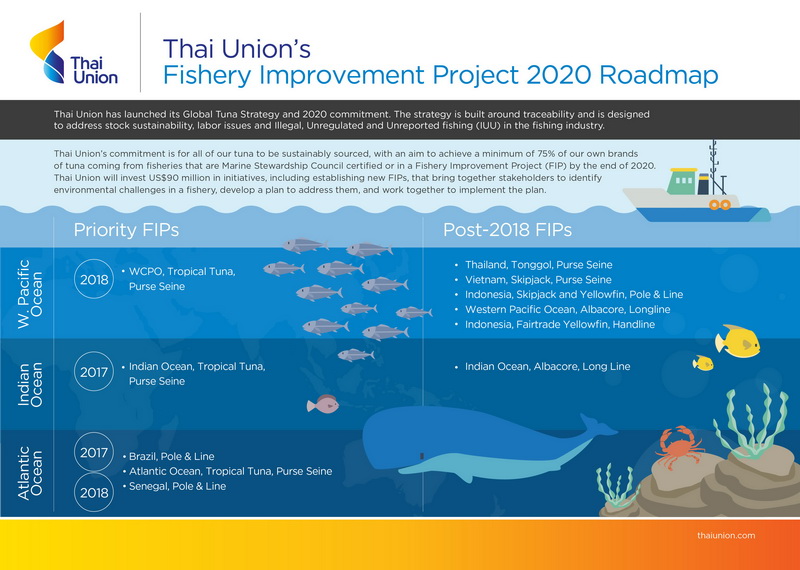Sustainability Successes in the Seafood Industry to Build On
By Dr. Darian McBain
As the new year approaches, it will be more important than ever for the entire fishing industry to move toward greater transparency and sustainability. It is now incumbent upon all of us to positively contribute to long-term socio-economic development, to sustain our natural resources and to ensure an ethical business conduct.
At Thai Union, this commitment to influence positive change is inherent in SeaChange® — our sustainability strategy designed to deliver real and lasting changes in the way we operate in the wider Thai and global fishing industries. And, with the support of our customers, partners and other stakeholders, we have made significant and substantive achievements in sustainability in 2016.
Some of these key successes include:
SeaChange®. As mentioned, SeaChange® is Thai Union’s sustainability strategy, which launched this year. It positions sustainability at the heart of our business and provides us with an integrated plan of initiatives organized into four focus areas — safe and legal labor, responsible sourcing, responsible operations and caring for our communities. It is designed to ensure Thai Union delivers against our own expanding sustainability objectives, the UN Sustainable Development Goals and, in the process, drives meaningful improvements across the entire global seafood industry.
Tuna Strategy and Commitment. Thai Union is making a $90 million investment to a new tuna strategy and global tuna commitment to source 100 percent of our branded tuna from fisheries that are either Marine Stewardship Council (MSC) certified, or engaged in Fishery Improvement Projects (FIPs) to move them toward MSC certification. We will aim to achieve a minimum of 75 percent by the end of 2020. In simple terms, this means Thai Union’s tuna will be sourced from areas around the world that follow strict standards and meet MSC certification — widely recognized by global experts as the best mark of seafood sustainability. These standards ensure fish are caught at levels that allow the species to repopulate, minimize potential environmental impact, and protect the diversity of the ecosystem.

Traceability. We believe traceability is the backbone of sustainability, and we responded to market demands for more transparency by achieving 100 percent traceability across our global tuna supply chain from catch to consumption. Traceability dramatically reduces the risk of illegal, unregulated and unreported (IUU) fishing, labor violations and human trafficking. An example is our can tracking program that allows consumers to see where and how their tuna was caught, the method utilized for catching, the details of the vessel and the processing technique.
Code of Conduct. The company introduced a more stringent Business Ethics and Labor Code of Conduct in 2015 both for our own staff and our supply chain. In 2016 we focused on rolling out the program to suppliers globally, including training events for our most critical suppliers. With a focus on the protection of human rights, and safe and legal work, the code applies to all of our group companies and contracted suppliers. We will continue carrying out audits to ensure the Code of Conduct is strictly adhered to, and we will continue providing educational and development opportunities to our suppliers so they can share in the growth of the company. Suppliers who fail to work to meet our standards will be unable to remain a supplier to Thai Union.
Audits. We continued to expand the number of external audits Thai Union undergoes. In 2016, we initiated an external audit process of the fleet supplying tuna to our European markets, which will be completed in 2017. This year our Thai shrimp feed supply chain was also externally audited to the Seafood Task Force labor code.
Furthermore, in 2016, Thai Union was pleased to be recognized in The Guardian for our traceability initiatives, as well as in The Associated Press for our actions to address shrimp labor conditions.
Additionally, we received numerous recognitions and awards, including PublicAffairsAsia’s Gold Standard Award for Global Corporate Citizenship, inclusion to the Dow Jones Sustainability Index for the third consecutive year, and being named a finalist for Thomson Reuters Foundation’s inaugural Stop Slavery Award for our efforts to combat modern day slavery.
We are proud of the successes we have experienced this year. They serve as a strong foundation and motivation for our future efforts. But our work is not complete. There are still significant improvements needed to ensure the sustainability of the seafood industry.
At Thai Union, we look forward to continuing to drive positive change in 2017 and beyond. We will remain focused on leveraging our leadership position and collective strengths on the most pressing and important sustainable development issues in our industry.